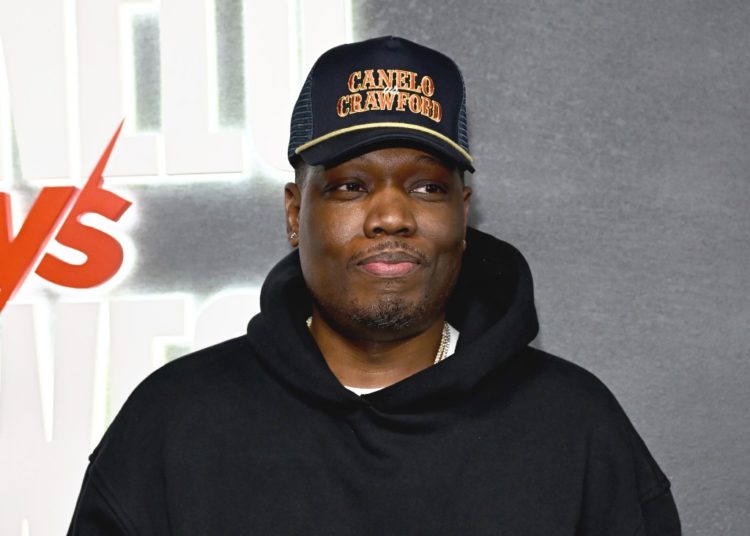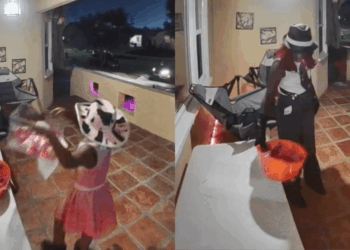Some Hollywood deals are hammered out in a boardroom, but the creative collaboration between Colin Farrell and the director Edward Berger began somewhere far less conventional three years ago, when they encountered each other in a London sauna.
“Two sweaty bodies in tight shorts and there was no looking back,” cracked Farrell.
Their chance meeting took place during an awards season when Farrell was riding high with “The Banshees of Inisherin” and Berger was promoting “All Quiet on the Western Front” while simultaneously making the papal thriller “Conclave,” a one-two breakthrough punch that cemented the filmmaker as one of Hollywood’s most in-demand directors.
At the time, Berger was being offered his pick of big films, including an “Ocean’s Eleven” sequel. He compared the experience to standing before an irresistible buffet, saying, “It’s like there are tomatoes and bananas and oranges and chocolate, and you want to eat all of it.”
Still, the film he was most eager to pitch Farrell in that sauna was a longtime passion project, “Ballad of a Small Player” (debuting on Netflix on Wednesday). Based on the novel by Lawrence Osborne, it follows Lord Doyle, a heavy-drinking British gambler on his last legs in the casino city Macau. Even as his debts pile up, Doyle is convinced that one good play could turn things around, but this is a man who doesn’t know when to say when.
Driven half-mad by anxiety and temptation, Doyle is one of the most intense characters Farrell has ever played, and when I met him and Berger last month at a Toronto hotel, the 49-year-old Irish actor admitted he had some trepidations about taking on the role. Maybe it helped that he was so disarmed by Berger’s sauna pitch. I asked him, “Is that a good place to make a deal?”
“There is something vulnerable and humble about it,” Farrell said, “and you don’t have time to put your mask on, even though you’re not aware of ever tossing one across your face.”
Here are edited excerpts from our conversation.
Colin, when you’re offered a character who’s on the precipice for the entirety of the movie, does that excite you or give you pause?
COLIN FARRELL I think I was terrified as much as excited when I read it. It was an extraordinary role on the page, but by the time I was going to Macau, I really didn’t want to get on the plane. I had just done “The Penguin” and I was knackered — fulfilled but just run ragged from that. Then there’s the sort of fear that can present itself as exhaustion, but it’s actually just fear. I was afraid of the script, I wasn’t afraid because of any history I have had with addiction, which has been well charted.
By the time it came to get on the plane, I remember saying to my sister: “Do I have to? Is there any chance we can get out?” And then you get there and you’re having a meeting with Ed and all of a sudden the energy he has put into it over the last six or seven years is there. It’s a river that’s already flowing and you step into it, and it’s really beneficial to me as an actor. So yeah, I was scared of the material for sure, but before I knew it, we were deep in the waters on Day 1, and there was no letting up.
EDWARD BERGER Colin brought much more vulnerability to the part than I had in my head. The part is really physical, constantly running and spending and emotionally draining. You undress. You make yourself vulnerable and naked.
FARRELL The character is so all over the place. He’s struggling from first scene to last, caught in a sustained breakdown of sorts. He’s just all over the shop.
Edward, you had your pick of Hollywood projects to follow “All Quiet” and “Conclave.” What was it about this story that kept you so determined to make it?
BERGER I really only found this out while doing it: It’s a story of a world of abundance where a man looks for a small haven of peace, and you could maybe translate it to that period in my life. The movies did well and suddenly it was, “Oh, I could do this, I could do this.” But because I also work a lot — shooting “Conclave” while [promoting] “All Quiet,” and then doing it again the next year with “Conclave” while we’re shooting “Ballad” — it empties you out.
With the world of Macau in “Ballad,” there’s lobster and steak and champagne and this character puts it all in and nothing fills him. That’s probably how I felt: You kind of feel empty afterward. You have these choices and all you want is something small, like your family or love.
Did you feel a pressure to pick projects that would maintain your career momentum? Colin, that’s something you can probably speak to.
FARRELL If you start concerning yourself with maintenance as opposed to exploring your curiosity, then it’s a condemnation of your potential. The idea of having a certain degree of choice I still find exotic 25 years in. I can’t do any film I want, but I might get a few scripts a month and three or four offers and there’s choices to be made. It’s a great privilege that is adjacent to potentially being a burden.
Why is it a burden?
FARRELL A potential burden — I don’t want to be quoted as saying it’s a burden! But when you potentially begin to concern yourself with the maintenance of a career, you stand outside what is a beautiful mystery and a journey of ups and downs. It should constantly be organic and fluid, so the idea that you want to constrict that thing and stay where you are defeats the purpose of what we all do.
Almost everything Doyle tells people about himself is built on a fabrication. So where do you start with a character like this?
FARRELL You start with the written word and then your imagination.
And I would imagine his ostentatious look helps sell it, too. His green velvet jacket, his yellow gloves …
FARRELL Yeah, the gloves and the suits. Oftentimes, actors also talk about how important shoes are, because a lot of the external stuff becomes part of the milieu of what you’re trying to tell as an actor. I remember once having a partner, and I would say to her, “I’m going out for a hike for a few hours to do a bit of work.” And she’s like, “What work?” I would say, “Well, it’s not work, I’m going out to just have a think.” She’s like, “But you can’t call that work.”
Do you feel differently about it?
FARRELL I think a lot of an actor’s work is done in moments of seeming passive inactivity. Every single human being is a Rolodex of the human experience and has felt fear, pain, sorrow — so you take the things you’ve felt and you amplify some of them and you mute other parts for a character. And if there’s something you feel your experience may lack, you’ve no doubt seen it on the street or heard a story about it or felt its invocation through a piece of music. So you take those things and you just throw paint at the wall. It really is so counter to academia and I was never good in school, so it’s a perfect job for one as unqualified as me.
What was the hardest part about shooting in real Macau casinos?
BERGER It’s very hard to plan because money counts. There’s constantly high rollers coming in and they call from the plane: “We’ll be there in an hour and a half and we need the suite.” These suites are reserved for the people that spend an unreachable amount of money, and you can’t book them. The doors were open to us, but that also meant you could be kicked out if a person comes and wants to spend 5 million or 50 [million].
The film did make me think about the nature of baccarat, Doyle’s preferred game. It’s so simple that it’s almost absurd, and you wonder if these high rollers play it just because they like that sensation of having no control over the outcome, of dangling themselves off a cliff.
BERGER I think that as well. There’s no strategy.
FARRELL But life is an agitative experience, do you know what I mean? We try to contain that agitation so we can get our kids to school on time, not scream at them, not slap our partners, not get into a road rage. And what baccarat and gambling does is it lets you get that agitation out. There’s a release or there’s greater frustration, but everything is given permission to be experienced. You don’t have to keep a lid on it.
One time we were shown behind the scenes by one of the floor managers. He took us into one of the high-roller rooms and there was two baccarat tables, and he said, “We had couple of guys in last night, and it was a good night for the house.” And I said, “Do you mind me asking what a good night for the house is?” And he said: “Well, we had two Chinese gentlemen. They played for four hours each, and the house was up 25 million.”
Wow.
FARRELL But he said, “The funny thing is they’re miserable when they’re up 25 as well.” They’re loaded and they know how to make things work in their favor, yet there’s still some internal agitation in them in that they want to go to a place where things are uncertain, where they could win or lose.
Colin, you’re at a point now in your career where things are more certain, or at least a little more secure than when you started out. How does it feel different?
FARRELL When I did “Tigerland” [2000] many moons ago, it all happened so fast — the meetings and the offers and the money. It all came at me with a thunderousness that was quite deafening and overwhelming, and I pretended that none of it meant anything. I was so afraid of being lost in it all that I tried to stick my flag in the sand and say: “I know where I’m from. I’m Irish, and I don’t care about any of this.” Now, at 49, my life is so full with my two kids, the friends I have, that the acting thing actually doesn’t mean to me now what it meant when I said it didn’t mean anything.
So it used to mean everything and you pretended it didn’t, and now …?
FARRELL Now it means something but it’s not all that, and that’s freed me up, it really has. It’s allowed me to attach momentarily in these grace notes when I go to work: I can throw myself in fully, then walk from it with a little bit more freedom than I used to. If I do a film and it goes to hell in a handbasket, it’ll hurt and then two weeks after the initial pain, I swear it’s gone. That’s lovely and allows me to care about it more than I could in the past.
Sounds like the best way to approach things.
FARRELL It’s the most fun, man. I love what I do for a living in a way that I never did in my twenties and I can’t believe I still get to do it. It sounds so diddly-shucks, but I know what films meant to me when I was a child and a young man, what they’ve taught me about the human condition and how they’ve just entertained me, whether it’s “Indiana Jones” or “Paris, Texas.” So yeah, I love doing what I do.
Kyle Buchanan is a pop culture reporter and also serves as The Projectionist, the awards season columnist for The Times.
The post Colin Farrell and Edward Berger on High Rollers and ‘Ballad of a Small Player’ appeared first on New York Times.




